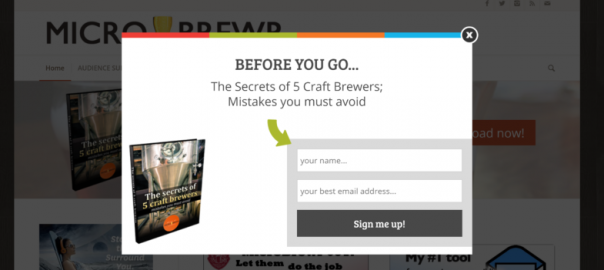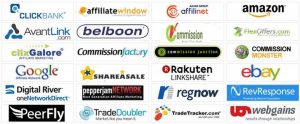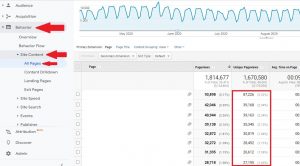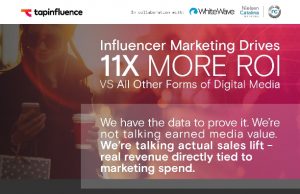— July 28, 2017
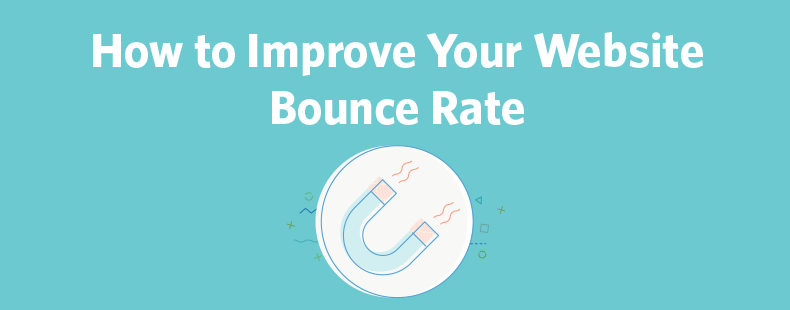
Do you have a high website bounce rate? Are you attracting a lot of traffic, but failing to turn those visitors into customers?
Having a million organic visitors sounds like quite an accomplishment, but ultimately, that traffic is worthless unless you can use it to drive business.
What if I tell you there’s a simple four-step process you can use to turn your organic visitors into leads and paying customers, no matter what niche or industry you’re in?
It’s not an instant fix — you’ll need to invest some time into getting this process set up.
But once you do, you’ll be surprised at how efficiently it works, and what a big impact it can have on your bounce rate…and bottom line.
Let’s get started turning that traffic into customers.
Step 1: Understand what your visitors are looking for
Let’s face it: just because you drive tremendous website traffic doesn’t mean that you can easily turn your website visitors into customers.
That’s because not every organic visitor is your ideal customer. They may just be browsing without any intention of making a purchase, or it could be that you don’t offer what they’re actually looking for.
Understanding your website visitors is critical for your business. Here are a few tips to learn more about them:
- Find organic search terms: In Google Analytics, you can get detailed insights by looking at the organic search terms report. You’ll find that an increasing number of results are listed as not provided; to extract that data, you may want to add a filter to your Google Analytics profile.
- Find your most popular content: Once you identify which pages attract the most traffic, you can focus your efforts on optimizing these posts for improving conversions.
- Find the highest converting pages: Understanding the highest converting pages will help you to learn what kind of content attracts customers for your business. Often you’ll find there’s a big difference between your most popular content and your highest converting content.
- Onsite search: By analyzing your onsite search trends, you can understand what your customers are expecting on your site and if they’re actually getting what they want. This is a great way to identify gaps in your content.
By understanding your audience, you’ll know exactly what they’re looking for, and how your business can meet their needs. Next, we’ll take a look at how you can use that data to convert visitors to customers.
Step 2: Encourage new visitors to opt-in to your email list
When you dig into your analytics in step one, you’ll probably find that about the majority of your first-time visitors will never return to your site.
In fact, it takes six to eight touches on average to generate a viable sales lead.
That’s why collecting email addresses from your potential customers is vital to your business. With an email newsletter, you can keep in contact with your customers until they’re ready to convert.
A simple email signup form won’t get you many subscribers, though. Most people are skeptical about giving away their email addresses to just anyone.
As a marketer, it’s your job to give them a compelling reason to share their email address with you. You can do that by offering a lead magnet: an incentive to offer potential buyers in exchange for their email address.
Lead magnets are usually valuable digital downloads such as ebooks, templates, cheat sheets, whitepapers, etc.
In step one, we looked at ways to understand what your organic visitors are looking for on your site. Armed with that data, you know exactly what kind of lead magnet to create to convert visitors to subscribers.
By offering a targeted lead magnet to your visitors, you’ll see your email subscribers skyrocket.
Step 3: Reengage abandoned visitors
What if your visitors aren’t ready to opt in to your email list during their first visit to your site?
You don’t have to give up on them. Here are a few ways to give them a second chance to connect:
- Remarketing on social media
Remarketing ads allow you to target people who have recently engaged with your site. You can grow your email list by creating a customized ad promoting your list building campaign.
For example, take a look at this Facebook ad that promotes a lead magnet:
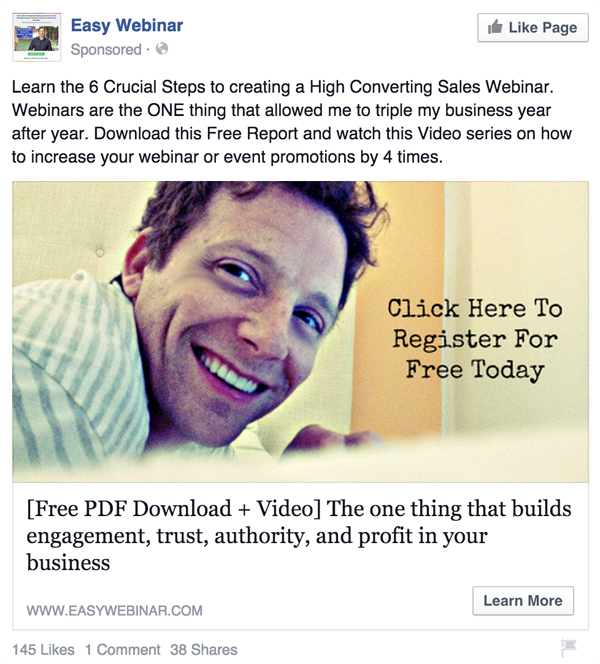
Just like the above ad, rather than sending them to one of your blog posts, you can encourage them to visit a landing page that is optimized for building your email list.
- Use an exit-intent popup
Onsite remarketing is another great strategy to convert an abandoning visitor into a subscriber. It detects user behavior and prompts your visitors with a targeted exit-intent popup at the precise moment they are about to leave.
You can use an opt-in form builder to create targeted exit-intent popups.
Because you’re targeting customers on your own site, it’s very cost effective compared to a remarketing ad campaign.
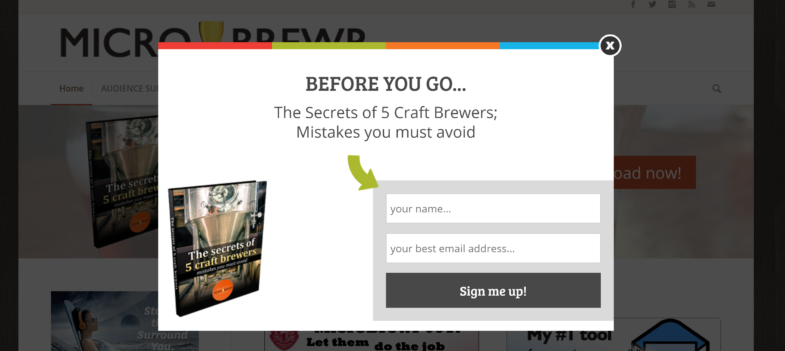
Step 4: Convert your email subscribers into customers
Ultimately, in order to convert those subscribers, you’ll have to nurture your leads from the moment they sign up till when you send your sales pitch.
Here are a few tips to help you nurture your email list:
- Segment your leads: You can segment your leads into distinct groups on the basis of different stages of customer lifecycle. This way, you can send customized emails addressing the needs of each stage.
- Write effective email copy: Writing email copy that converts is both an art and a science. Make sure to have a good balance between useful, engaging content, and promotional copy.
- Test and refine: Last but not least, keep an eye on your email reports. Measure how engaging your email newsletter campaigns are in terms of open rate and click-through rate. Make sure you test and refine the campaigns on a regular basis for better results.
Decrease your website bounce rate, increase your loyal customers
Now you know how to decrease your website bounce rate and convert your traffic into customers.
By understanding your visitors’ needs, converting them to email subscribers, and nurturing leads via your email newsletter you’ll see that bounce rate go down and your sales go up in no time!
Digital & Social Articles on Business 2 Community
(94)
Report Post